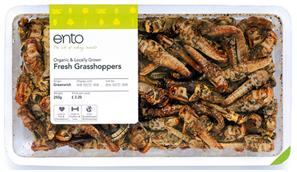With 40 tonnes of bugs and grubs for every human on earth, insects are an abundant and sustainable food source. They are rich in protein, iron and calcium and low in fat and cholesterol. This potential has been recognised by the European Union which offered $3million to research the use of insects in cooking, as well as the United Nations’ Food and Agriculture Organisation which published a list of almost 2000 edible insect species.
According to new data from Canadean insects could still be hard to sell as 65% of consumers say they would not be willing to try foods made from processed insects, despite their undisputable nutritional values.
Wrap it up nicely

The study suggested that the major obstacle to insect eating was palatability. For that reason consumers who are given a detailed, flavor-focused product descriptions are more likely to consider eating insects. The report added that the way the insect-derived products are presented and marketed would be key in convincing consumers.
“Processed insects will be an easier sell than products than products where consumers can see the insects in front of them. To get past the disgust barrier, insect-derived foods must have a stronger visual appeal and not be recognisably bug-based,” Catherine O’Connor, senior analyst at Canadean told FoodNavigator.
Another way to boost the appeal of bug-based food would be to link them in flavor and design to places such as Africa or south-east Asia where insect eating is more common, according to Canadean.
There is ‘insects’ and ‘INSECTS’

While companies such as Chapul and Exo were both finding success in the US with cricket flour protein bars positioned as a natural energy boost, O’Connor explained that it was key to choose the right insects.
“We’re seeing the most hype about crickets due to the superior health boost they offer, containing two times more protein than beef and 15% more iron than spinach. Here, the health benefits of ingredients such as processed cricket flour are helping to convince more adventurous consumers to push past their squeamishness and give them a go. Insects that consumers already have a negative perception about would be less appealing, such as those seen as pests.”
To suit every pocket?
According to O'Connor, although insects are in abundance and are a sustainable source, they are not yet easily affordable.
“At the moment, insect-derived products are expensive because the industry is in its infancy. If their popularity becomes more widespread, infrastructure developments would render them more affordable, moving them beyond a treat for the experience-seeker,” said O’Connor.
“As concerns over the sustainability of current food industry practices becomes more widespread, we predict an upturn in manufacturers looking for alternative options, as well as consumers being more proactive in their own approaches. After getting consumers to try insects in the first place, another hurdle will be convincing them to keep eating them as a regular part of their diet once the novelty of the experience has worn off. Indeed, 65% of consumers who would eat insects, said they would only try them for the experience. By comparison, 16% were interested in eating them regularly,” she added.
Is it a man’s world?
The report stated that men were a lot more eager than women with 47% of them willing to try insects, compared to 34% of women.
“This is partly due to men being more desirous of products that offer a protein boost, but also masculine bravado making men receptive to trying more extreme food experiences. Men tend to be greater experience seekers than women in their food consumption, with women prioritising indulgence and taste higher than novelty. Those aged 35-44 were also the most keen, with 49% of them reporting that they would eat insect,” said O’Connor.
